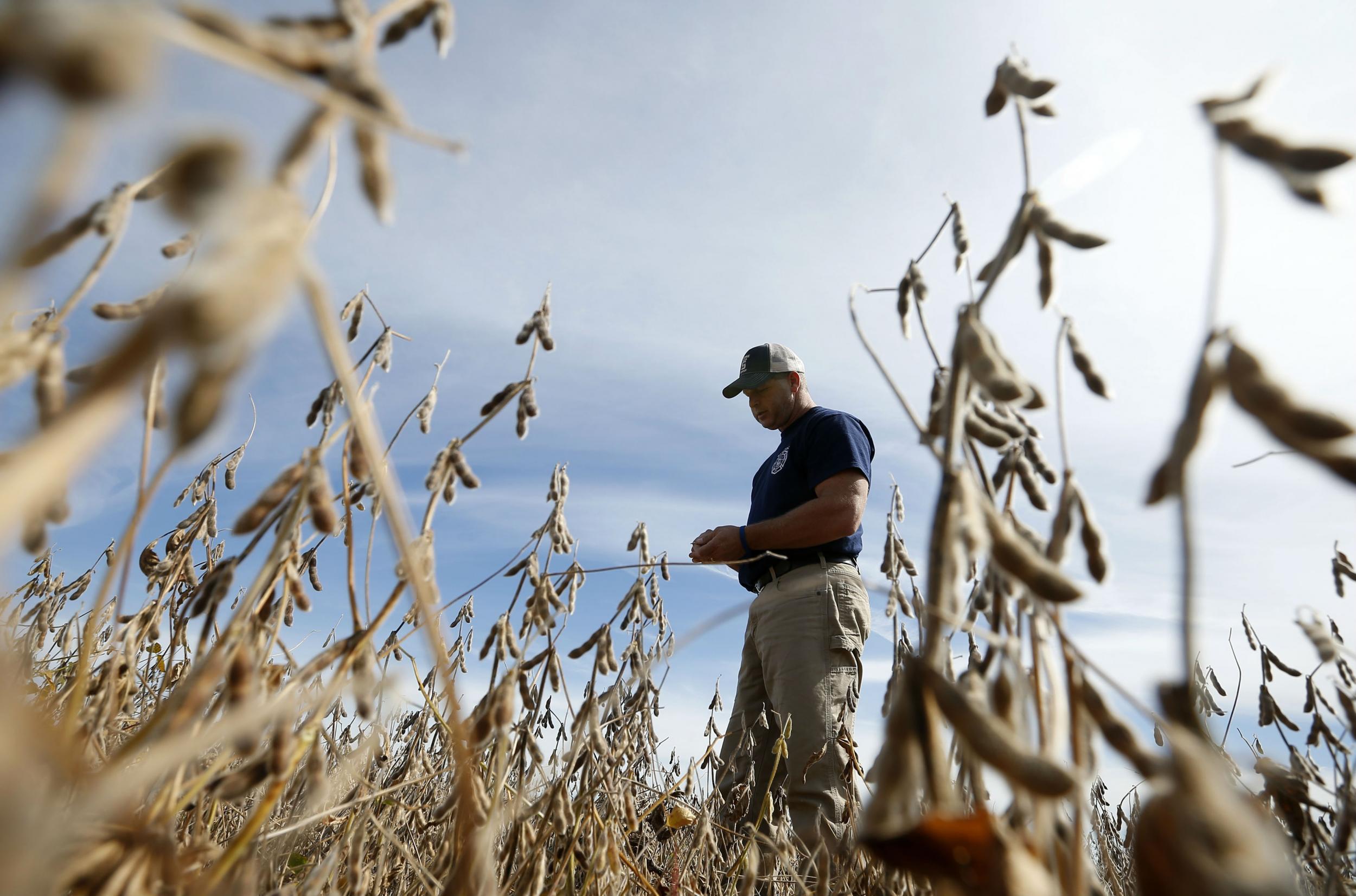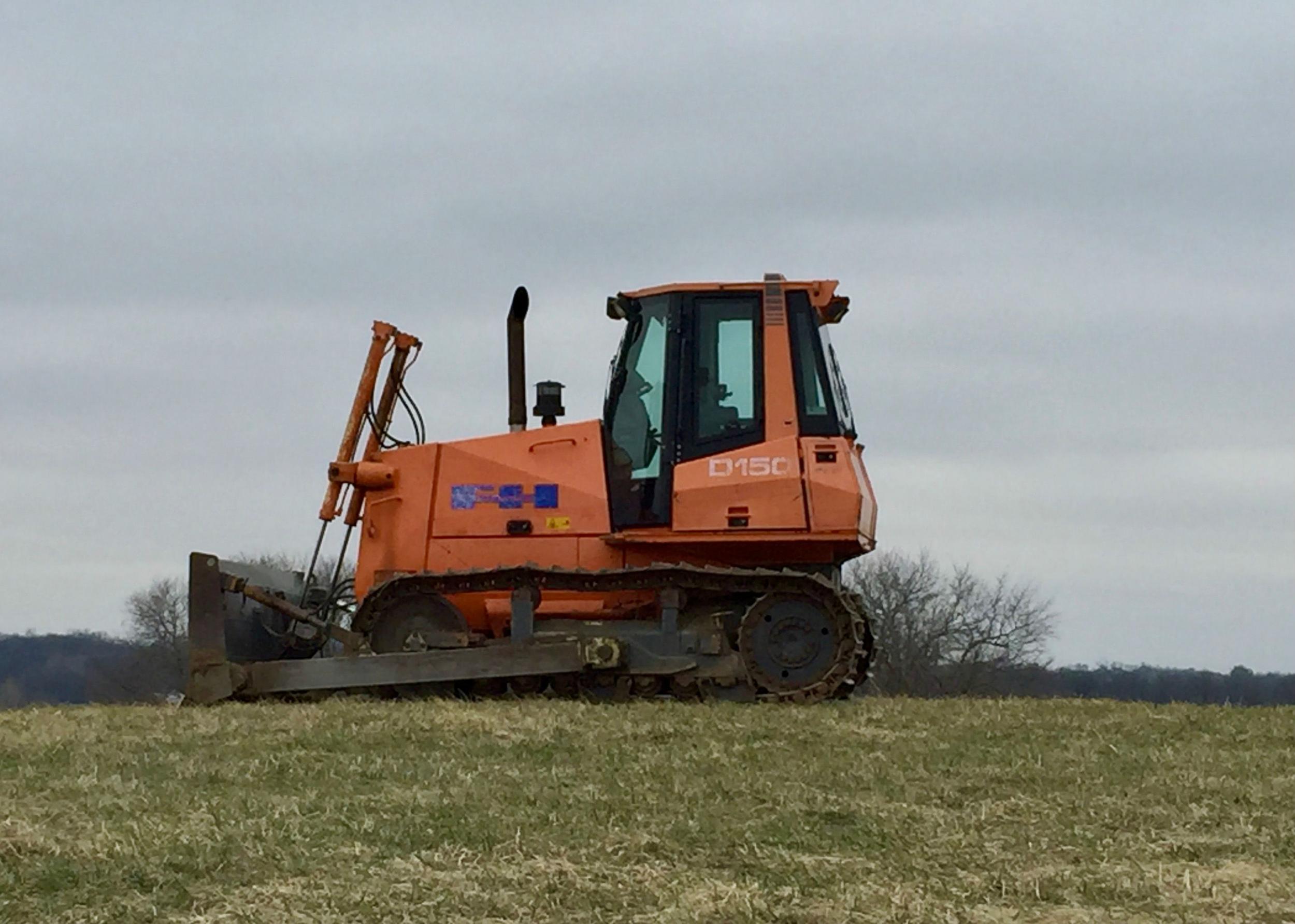These farmers voted for Donald Trump. But now they fear a trade war with China will ruin them
America is China’s largest exporter of soy beans, worth between $10-$14bn

Your support helps us to tell the story
From reproductive rights to climate change to Big Tech, The Independent is on the ground when the story is developing. Whether it's investigating the financials of Elon Musk's pro-Trump PAC or producing our latest documentary, 'The A Word', which shines a light on the American women fighting for reproductive rights, we know how important it is to parse out the facts from the messaging.
At such a critical moment in US history, we need reporters on the ground. Your donation allows us to keep sending journalists to speak to both sides of the story.
The Independent is trusted by Americans across the entire political spectrum. And unlike many other quality news outlets, we choose not to lock Americans out of our reporting and analysis with paywalls. We believe quality journalism should be available to everyone, paid for by those who can afford it.
Your support makes all the difference.Ted Rogers has been growing soybeans and wheat on these quiet fields in northwest Missouri for close to 50 years. But if things get any tougher, if the margins between making a living and failing to get by become any more narrow, he is ready to call it a day.
“I don’t know what will happen,” he says, sitting with his wife, Rhonda, as they prepare dinner one evening. “Because if it gets any closer, I don’t know how anyone could make a living. In that case, I would just retire. I don’t know.”
Farmers around the world have forever battled with the inconsistencies of variable weather and market prices that can change daily. Now, American soy farmers have another threat: a possible boycott of their product by China, the world’s largest importer, as part of a tit-for-tat trade war started by President Trump.

Many of the farmers here voted for Mr Trump. He beat Hillary Clinton in the state – 56 per cent of the vote to her 38 per cent. In Buchanan County, where Mr Rogers lives, his victory was an even more convincing 60:34.
But people are now anxious they could suffer as a result of a possible trade war that the man they voted for has claimed would be a “good thing” for America.
Last week, Mr Trump announced tariffs on at least $50bn of Chinese goods, a step he said he was taking to punish Beijing for intellectual property theft and to address a trade deficit he could no longer ignore.
The president said he considered China a friend and had “tremendous respect” for Chinese President Xi Jinping. He added: “But we have a trade deficit ... there are many different ways of looking at it, but no matter which way you look at it, it is the largest trade deficit of any country in the history of the world.”
China hit back almost immediately. Its commerce ministry said Beijing planned to impose its own tariffs on $3bn of US imports, a list that ran to 120 items, and which included wine, pork and aluminium.
“China does not want to fight a trade war, but it is absolutely not afraid of a trade war,” the ministry said.
The official Chinese statement did not refer to soybeans, but many experts believe it could be holding back that threat. Although there is growing competition from South America, the US remains China’s primary supplier of soy. A total of 30m tonnes, worth $10bn, were exported last year. China buys 57 per cent of all US soy exports, which it uses to feed an estimated 400 million pigs.
Jitters about a threat to this crucial market were triggered by an editorial last week in the Global Times, a newspaper closely associated with China’s ruling Communist Party, which accused the US of destroying Chinese farmers and breaking World Trade Organisation rules. It called for “restrictive measures” against the imports.
“The imported soybeans have taken over the domestic market. An important reason is that imported soybeans, especially from the US, received huge subsidies,” the article said. “Strong restrictive measures need to be taken against the massive subsidies and dumping of soybeans by some countries on China.”
Mr Roger, who farms around 700 acres, says he and his family have lived in their property since 1957 and that he followed his father, grandfather and great grandfather into farming. The family continuously tilled one parcel of land dating back to the Civil War. Between 1861 and 1865 this part of the nation frequently marked the front line between Confederate and United States’ forces.

Ms Rogers says when a friend asked if he could explore the field with a metal detector, he discovered dozens of musket balls. “People fought over this land,” she adds.
Jean Roberts, who runs a farm supply business in Dearborn with her husband, says most people grew a combination of soy and corn on farms that could run to as many as 10,000 acres. In this part of the country they farmed without additional irrigation and could expect a single harvest of each crop. Soybeans are due to be planted within the next two weeks.
“It’s all about yield,” she says. “But you’re gambling with Mother Nature.”
Bob Cassity, 71, has been farming soy and wheat on around 1,000 acres for as long as he can remember. His family supplements its income with a contract to operate and run the local school bus service.
He says he voted for Mr Trump, though he does not like everything the president’s done. And he said if China were to impose tariffs on soy it could have a considerable negative impact. “We’re just getting ready to plant,” he said.
A younger farmer, aged 40, asks to be identified only by his first name, Adam. He and his fellow farmers were always facing one challenge or another. He said he hoped the Chinese threat would not come true but if it did, he believed US soy farmers could find others markets.
Adam, who voted for Mr Trump, says he admired the way the president was speaking out for US producers and manufacturers. “I think we have been run over on trade. I think people play the game harder than we do,” he says.
Chad Hart, a professor of economics at Iowa State University, says is unlikely China would halt all US imports. But even if exports were to drop by a quarter, it would have a considerable impact. Missouri was the sixth largest producer of soybeans between 2014-2017, with Iowa and Illinois scrapping it out for first place.

“If a rural community was already on the edge, this could push it over,” says Hart. “Others are just going to continue. But they will do less well and that will impact the whole community – the stores, the seed salespeople, local mechanics.”
He adds: “Rural communities have been under pressure for the last few years and this will add to that.”
The American Soybean Association, a 95-year-old trade organisation which says it represents 21,000 US soybean producers, says “retaliation by China will cost farmers their livelihoods”. It was also critical of Mr Trump’s decision to impose tariffs.
“Farm incomes are down nearly 50 per cent from 2013. There is a real struggle in agriculture to keep everything going right now. It’s extremely frustrating to have the administration taking aim at our largest trading partner,” the group says.
“We previously requested a meeting with President Trump to discuss our concerns and have received no response to date.”
It adds: “On National Agriculture Day, the president tweeted that his administration is delivering for farmers. But delivering for farmers means supporting trade and, for soybean farmers, that means supporting trade with China.”
Join our commenting forum
Join thought-provoking conversations, follow other Independent readers and see their replies
Comments